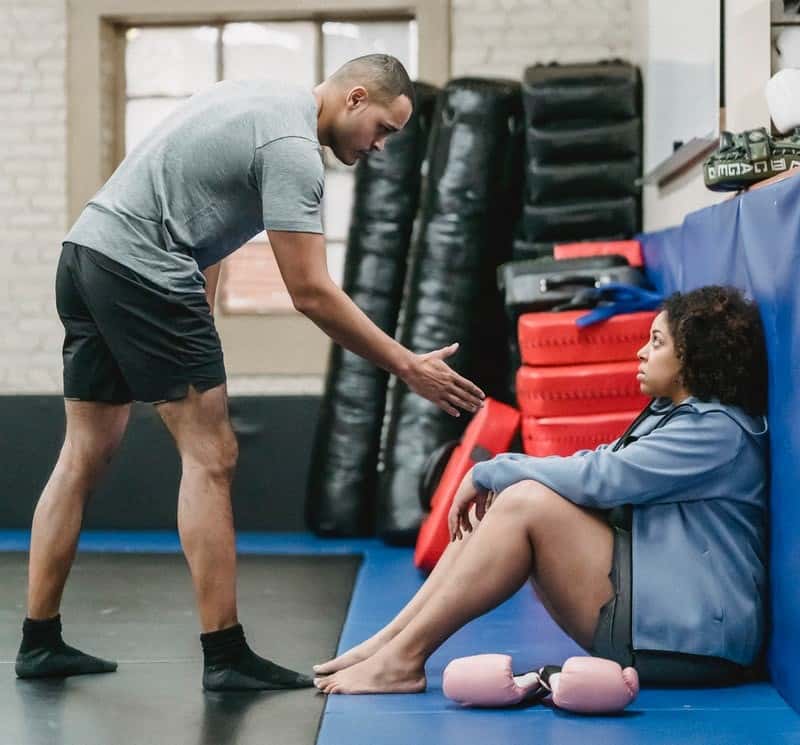The symptoms of exhaustion try to tell our brains that the body is all done and needs a break. But, we are into the fitness lifestyle and know that exhaustion is a necessary phase in order to induce fitness, strength training and physique improvements. What do the symptoms of exhaustion really mean to us fitness junkies? Let’s examine what exhaustion means for us.
What Is Exhaustion, Really?
Obviously, we aren’t talking about the medical terms for exhaustion. We are talking about being exhausted from exercise in this article.
So, exhaustion is reaching the limit of physical fitness and the body reacts in certain ways to try and tell us to slow down and/or stop. You can’t just keep going and going. Exhaustion sets in and we have to take the right steps towards recovery if we want this to be a long term thing.

We aren’t going to get complicated. You train, you get tired, and you see signs of exhaustion. Got it?
The Levels Of Exhaustion
Not all exhaustion is the same. Some responses are acute, meaning they happen immediately and go away after a quick bout of recovery time. Then, there are chronic symptoms of exhausting, like one would see if they ever were to experience overtraining in its true sense. These are opposite sides of the spectrum, and there is quite a bit of middle ground to cover.
Some signs of exhaustion are actually beneficial and good markers that you are training hard enough. Some signs are like caution tape: maybe you shouldn’t continue. Then, there are serious signs of exhaustion that can put you out of the game for months on end.
They aren’t all the same, and you need to know the ranges of exhaustion to know what you are up against.
So, here are 3 categories of exhaustion to examine, in regards to training.
Minor Exhaustion
This is the acute response to training itself. The symptoms of exhaustion at this level are experienced pretty much every training session:
- Increasing heart rate
- Increased breathing rate
- Sweating
- Lactic acid burn in the muscles
Any symptom that comes and goes within minutes is a sign of minor exhaustion. These symptoms are actually beneficial, as they let you know that you are pushing hard enough to make progress.
A workout without these things happening probably won’t get you anywhere! These symptoms are easily alleviated with rest between sets and are completely gone after your workout session.

You may feel exhausted, which means you still need to focus on recovery. But, this level of exhaustion carries very little risk for long-term effects.
Moderate Exhaustion
This level of exhaustion isn’t typically seen in one training session. However, it may be seen in extra-long endurance events. At the time, they may seem very serious, but they can be remedied quite quickly with the right recovery tactics.
Here are some of the common symptoms that an endurance racer might see:
- Numbness in muscles after intense lactic acid burning
- Dizziness and a cloudy mind
- Deteriorated fine motor skills
- Collapsing (not passing out, just from fatigue)
- Intense soreness and stiffness that lingers (not to be confused with DOMS)
These signs should be a stop sign. These are the last steps that your body takes before you approach overtraining.
Training programs with too much volume, intensity, frequency, or a combination of any of those 3 can cause these symptoms of exhaustion.

Reaching this point means you need a break until all the symptoms are gone. Then you may resume training, albeit at a lower level until you know how recovered you really are.
Nutrition and sleep play a big part in relieving these symptoms of exhaustion. There is a great range of tips to get more sleep!
Serious Exhaustion
Taking exhaustion to its peak, overtraining can lead to serious issues for your health and wellbeing. While it’s uncommon to reach this stage of fatigue, it can have lasting effects on the body.
The symptoms of overtraining can be serious. Here are some of the common ones:
- Drastic drop in performance and physical fitness
- Feeling mentally drained and depressed
- Negative hormonal changes
- Muscle loss and fat gain
- Drop in sleep quality and quantity
- Lowered immune system
- Digestive distress
These symptoms don’t just go away either. Recovering from serious exhaustion, like overtraining, can take weeks or even months. If you feeling any of these symptoms creeping in, it best to rethink and consider how you can make your workout plan help you to lower the intensity a little bit.
Again, most people will never reach this level of exhaustion. But, if you ever do, know that it is a serious condition and the proper steps towards recovery must be taken. You don’t want your long-term health to suffer in the name of gains, do you?
Combat The Symptoms Of Exhaustion
Feeling minor exhaustion is just fine. In fact, it’s pretty much the goal of training. But, once you start feeling a compounding effect, it’s time to take a break. You want to stay away from moderate and serious levels of exhaustion, if at all possible.
Most of us aren’t professional athletes and, even if we compete in sports, it’s a hobby. Sacrificing your body isn’t worth it in the long run. Professionals often can deal and recover from performing at their pain cave limits but it’s not good for majority of us, so please be careful.

That’s why it’s important to train smarter, not harder. Focus on optimal levels of intensity, volume, and frequency while ensuring your recovery is efficient. Make sure you know your body and know the best recovery after workout that works for you! Performing proper cool down exercises and stretch routine are a great way to prevent exhaustion.
Your diet plays a huge role in exhaustion as well, since the calories are eaten are your main source of fuel and the way your body can fight off fatigue. There are plenty of macro calculators available to make sure you are eating what your body needs, especially pay attention to knowing how much protein you should eat.
When in doubt, sit it out! An extra rest day here and there to get rid of the nagging signs of exhaustion will be worth it and won’t derail your progress. The best offense is a good defense.
Avoid Exhaustion Altogether!
Being “hardcore” and training until you puke or pass out isn’t necessary or even beneficial. Symptoms of exhaustion can become very serious very quickly, so monitoring yourself should always be a priority!
My personal way to deal with exhaustion is to do light exercises like Stand-up Paddle Boarding.
